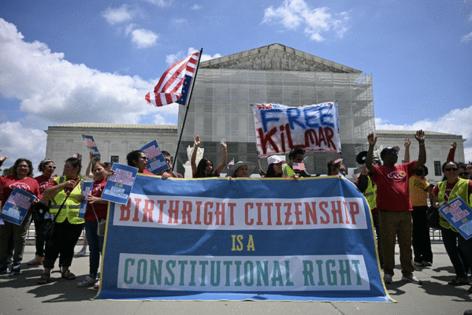Supreme Court sounds open to limits on nationwide injunctions
Published in Political News
WASHINGTON — A majority of the Supreme Court appeared ready Thursday to place some limits on the power of single federal district judges to freeze presidential actions nationwide, in oral arguments over the future of President Donald Trump’s effort to end birthright citizenship.
However, the justices appeared divided on just how to do so in three cases, where the court procedures could shape the future citizenship status of thousands of American-born children.
The arguments reflected a years-long struggle over nationwide injunctions, which have exploded in use over the past several decades and frustrated presidents from both parties who sought to use their authority to make policy changes.
The executive order from Trump, signed on the first day of his second term as part of a tough-on-immigration approach, sought to deny citizenship to children born in the United States if their parents were not current citizens or permanent residents.
Courts have blocked the government from enforcing the policy through nationwide injunctions, finding it contradicts more than a century of established law about who gets citizenship. The government did not ask the justices to weigh in on the merits of the executive order, only to limit the scope of those injunctions.
Solicitor General D. John Sauer, representing the government, said there has been a “flood or cascade” of dozens of nationwide injunctions handicapping the Trump administration. Lower courts have become a “roving commission to correct every legal wrong” they can find, Sauer said.
Sauer argued that the Supreme Court should limit the injunctions to only the states, families and nonprofits who filed the lawsuits in these cases, as well as declare that courts do not have the power to issue nationwide injunctions before they formally rule that an administration violated the law.
Several members of the conservative wing of the court expressed frustration with nationwide injunctions, and Justice Samuel A. Alito Jr. said lower court judges are “vulnerable to an occupational disease” when they have the option of issuing a nationwide injunction.
“Which is the disease of thinking that ‘I am right, and I can do whatever I want,” Alito said.
However, several conservative justices also balked at the argument that nationwide injunctions should never be available. Justice Brett M. Kavanaugh pointed to instances where the justices upheld nationwide injunctions against the Biden administration’s eviction moratorium and coronavirus vaccination mandate.
It can take a year or more for the Supreme Court to decide the legality of a policy, Kavanaugh said, and it’s “really important whether they’re in effect for that year or two.”
Kavanaugh and other conservatives on the court raised the possibility of requiring that injunctions be limited to class-action lawsuits, where a court has already found a defined group of people harmed by the government.
Kavanaugh also pointed out that the proliferation of nationwide injunctions may stem from executive overreach rather than judicial malfeasance. It’s harder to pass legislation through Congress, he said, and presidents of both parties have had to address modern problems with old laws.
Courts are “finding these actions illegal because they’re exceeding existing authority,” Kavanaugh said.
Justice Sonia Sotomayor, at one point in the arguments, said that “as far as I can see it, this order violates four Supreme Court precedents.”
All nine justices wrestled with how thousands of children would be affected if the justices allowed the birthright citizenship order to go partially into effect as the court fights continue.
Trump’s order would have directed federal offices to deny Social Security numbers, passports and other citizenship documents to any child where at least one parent was not a citizen or legal permanent resident.
The states, nonprofits and families who challenged the policy argued it went against more than a century of Supreme Court precedent and the way the country has defined citizenship since the 1860s.
They also pointed out that the executive order would impact hundreds of thousands of infants each year, opening them up to deportation or statelessness.
New Jersey Solicitor General Jeremy M. Feigenbaum argued that the executive order could create real problems for the state’s ability to administer federal benefits programs, like Medicaid and CHIP, that hinge on the citizenship of the beneficiary.
Feigenbaum said that restricting courts’ powers to issue injunctions would have serious consequences for New Jersey, where there is an annual average of 6,000 babies born to New Jersey parents out of state.
The state would have to verify whose citizenship “turned on” at the border when they return, since they may not have gotten Social Security numbers or other federal documents from their birth states.
“Since the 14th Amendment, our country has never allowed American citizenship to vary based on the state in which someone resides,” Feigenbaum said.
The justices on the court’s liberal wing repeatedly pointed out that restricting nationwide injunctions would have serious consequences for the states and children nationwide, as well as the power of the courts themselves.
Sotomayor said that denying nationwide injunctions over the executive order would allow thousands of people to be born without citizenship, or even be born stateless.
Sotomayor also pointed out that the Trump administration’s argument would give the federal government license to act unconstitutionally for months or years while waiting for the courts to find it illegal after the fact.
The cases are Trump et al. v. CASA Inc. et al.; Trump et al. v. Washington, et al.; and Trump et al. v. New Jersey et al.
_____
©2025 CQ-Roll Call, Inc., All Rights Reserved. Visit cqrollcall.com. Distributed by Tribune Content Agency, LLC.



























































Comments